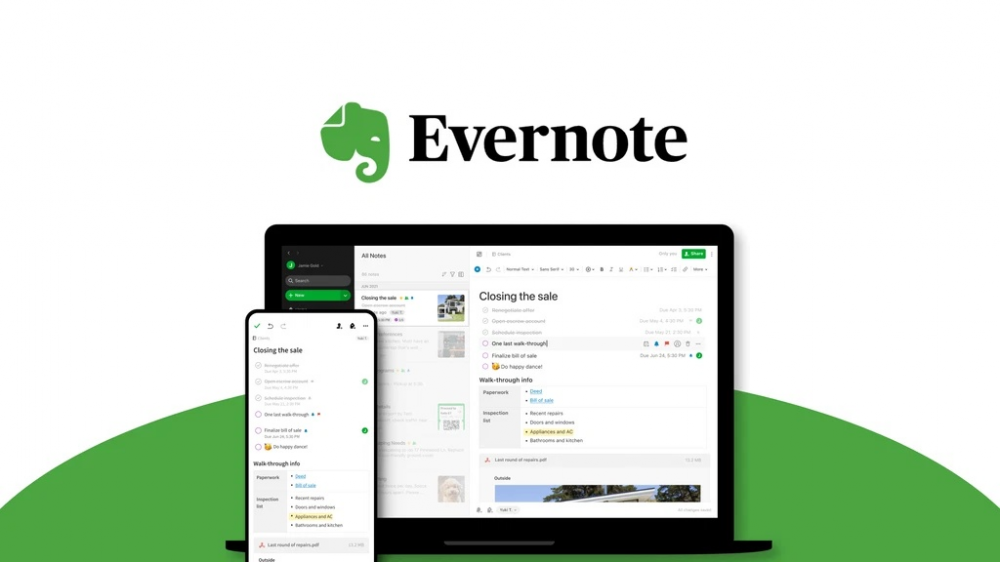Δημοσιεύθηκε στο deasy.gr, 10.02.2026
Μετά από 17 χρόνια αυτές τις μέρες εγκατέλειψα το Evernote – ήμουν συνδρομητής από το 2009 (δείτε πχ εδώ και εδώ παλιότερα κείμενά μου γι αυτό). Να διευκρινίσω αμέσως ότι δεν φταίει ο κατασκευαστής. Παρότι η εφαρμογή άλλαξε χέρια πριν λίγα χρόνια, και οι νέοι ιδιοκτήτες συνέχισαν να την βελτιώνουν, ίσως και περισσότερο από τους προηγούμενους. Ήταν η ζωή μου που άλλαξε, αφού χρειάστηκα εδώ και λίγα χρόνια ισχυρότερη εφαρμογή «δεύτερου μυαλού» (second mind) και αναγκαστικά μετακινήθηκα προς Devonthink.
Καθώς έκανα τις απαραίτητες εργασίες μετεγκατάστασης (backups κλπ.), με έπιασε μια νοσταλγία, σε βαθμό που πήρα screenshot την οθόνη του account μου που έλεγε «subscriber since 2009» (και την «ανέβασα» στο Devonthink…). Σκέφτηκα ότι ήταν το μακροβιότερο πρόγραμμα στον υπολογιστή μου, το μόνο που επιβίωσε και την μετακόμισή μου από PC σε Mac πριν καμιά δεκαριά χρόνια. Υπάρχει όμως άραγε κάτι τέτοιο; Υπάρχει συναίσθημα (από τη μεριά του χρήστη!) στο software;
Στα αντικείμενα του πραγματικού κόσμου σίγουρα υπάρχει. Τις προάλλες έσπασα ένα ποτήρι-σφηνάκι που ήταν σουβενίρ από πρόσφατο ταξίδι μου και στεναχωρήθηκα πολύ – καμία σχέση με την πραγματική αξία του αντικειμένου, είχε μια άλλη, συναισθηματική για μένα. Το ίδιο και με άλλα αντικείμενα του σπιτιού ή της εργασίας μας, ακόμα και με εργαλεία (για να προσεγγίσουμε το software): σιγά-σιγά καθένα μέσα από τις συνθήκες απόκτησης ή χρήσης του αποκτά αξία συναισθηματική. Αυτή η αξία μερικές φορές μας κάνει να κάνουμε κιόλας παράλογα πράγματα, να βάζουμε σε προστατευμένες βιτρίνες αντικείμενα χαμηλής αξίας, να μην διαβάζουμε κάποια βιβλία μας (για να μην τσακίσει η ράχη τους) ή να μην χρησιμοποιούμε κάποια εργαλεία σε δύσκολες εργασίες από το φόβο μην ταλαιπωρηθούν.
Συμβαίνει το ίδιο άραγε και στο software; Σήμερα, αν είναι κάτι που μας συνοδεύει κάθε μέρα είναι το software που χρησιμοποιεί καθένας μας. Συνδεόμαστε καθόλου συναισθηματικά με αυτό;
Θεωρητικά οι συνθήκες είναι ίδιες. Ακόμα και οι συνθήκες απόκτησης, πολλές φορές: Θυμάμαι τις συνθήκες μου απόκτησης, τότε, του Evernote, όπως ακόμα καλύτερα θυμάμαι τις συνθήκες μου απόκτησης του ChatGPT Plus νωρίτερα αυτόν τον χρόνο. Επιπλέον, η χρήση του software είναι καθημερινή – δεν είχε περάσει μέρα (ή, έστω, εβδομάδα) που να μην είχα χρησιμοποιήσει το Evernote αυτά τα 17 χρόνια. Ακόμα περισσότερο σήμερα, με το ChatGPT. Που η σύνδεση;
Φυσικά, οι συνθήκες χρήσης είναι διαφορετικές. Τα αντικείμενα τα πιάνουμε στα χέρια μας, ερχόμαστε σε άμεση επαφή μαζί τους. Το software όχι, παρεμβάλλεται ο υπολογιστής, το smartphone κλπ. (Επομένως, μια άλλη, διαφορετική, συζήτηση θα ήταν αν συνδεόμαστε συναισθηματικά με το hardware μας…). Είναι δηλαδή η διαφορά αναλογικού και ψηφιακού κόσμου: ο πρώτος είναι αδιαμεσολάβητος για τους ανθρώπους, ενώ ο δεύτερος γίνεται αντιληπτός μέσω proxy.
Αυτό ίσως εξηγεί μια κάποια απόσταση, αν και η αντίδρασή μου με το Evernote δείχνει ότι και στον ψηφιακό κόσμο χωρούν συναισθηματισμοί, ίσως.
Ισχύει αυτό με οποιοδήποτε software; Ξεκάθαρα όχι. Αμέσως-αμέσως, αν ήθελα να είμαι ειλικρινής, η μακροβιότερη εφαρμογή στον υπολογιστή μου είναι το MS Word – είμαι χρήστης σχεδόν από την αρχή, από το 2.0. Εκεί δεν νιώθω κάποιον συναισθηματισμό είναι η αλήθεια – με χαρά θα «ξεφορτωνόμουν» το Word αν οι παγκόσμιες συνθήκες το επέτρεπαν (είναι το de facto παγκόσμιο πρότυπο όπου η ανθρωπότητα γράφει τα κείμενά της, εδώ και δεκαετίες…). Από την άλλη μεριά, επειδή word processing έμαθα με το WordPerfect 5.1, πάντα είχα ένα συναισθηματικό δέσιμο με αυτό (και μια στεναχώρια που δεν τα κατάφερε τελικά, παρά την, τότε, αδιαμφισβήτητη τεχνική ανωτερότητά του).
Ίσως επομένως και το είδος του software να επηρεάζει. Το MS Word είναι προϊόν «αυτοκρατορίας», ενώ το Evernote μια προσπάθεια ενός startupper που στην ουσία μεγάλωσε μαζί μου. Ίσως αλλιώς εκτιμούμε το ένα και αλλιώς το άλλο – και ίσως αυτό εξηγεί την πρόσφατη στροφή μου στο artisanal software. Από την άλλη μεριά, για την ώρα δεν θα αμφισβητήσω ότι υπάρχει «δέσιμο» με το ChatGPT μου (το θέμα άλλωστε αποτελεί αντικείμενο επιστημονικής έρευνας αυτή την περίοδο).
Που μας αφήνουν όλα αυτά; Στο screenshot μου του Evernote (στ’ αλήθεια σκέφτηκα σοβαρά μήπως το πληρώνω για άλλα τρία χρόνια χωρίς να το χρησιμοποιώ ώστε να «στρογγυλέψω» εικοσαετία) και στις σκέψεις μου για τα υπόλοιπα προγράμματα που χρησιμοποιώ κάθε μέρα και χωρίς τα οποία απλά δεν μπορώ να φανταστώ τη ζωή μου, σε αντίθεση με το ποτήρι-σφηνάκι, του οποίου η απώλεια μπορεί να με στεναχώρησε όμως δεν υπήρξε λόγος να το αντικαταστήσω – ίσα ίσα.





